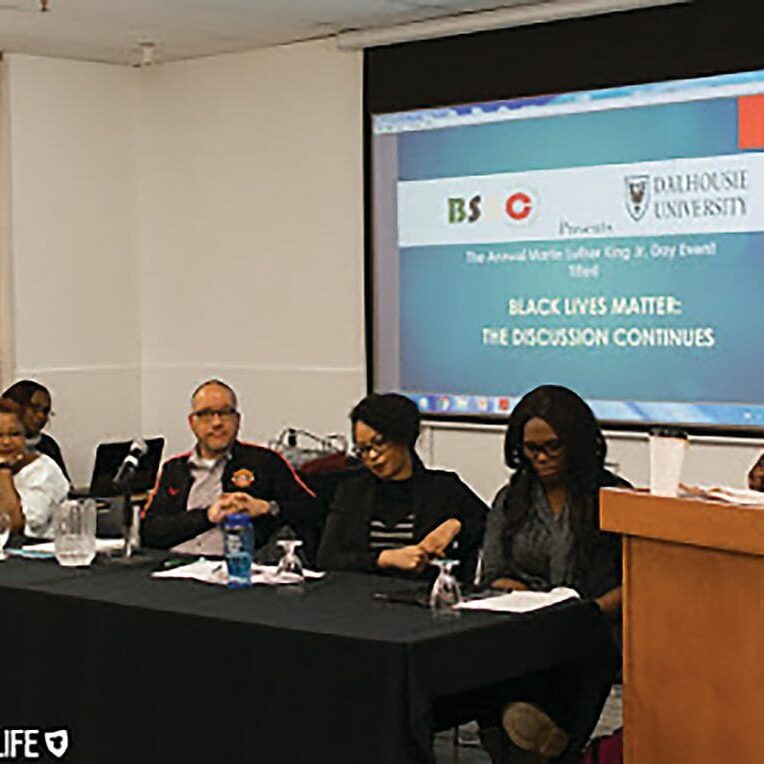
Dalhousie’s Black Students Advising Centre hosts panel on MLK Day
Black Lives Matter, Abdoul Abdi, among topics covered
On Monday, Jan. 15, Dalhousie University’s Black Student Advising Centre celebrated Dr. Martin Luther King, Jr. Day with a panel on Black liberation. The panelists were Tiffany Gordon, Amina Abawajy, Dr. Barbara Hamilton Hinch and Sonnobia Williams, and the moderator was Isaac Saney.
“It’s important to bring people together and to allow them to have these kinds of conversations,” says Gordon, who is currently completing her PhD in philosophy. “Every year, when we have these events, it’s pretty packed because people need to hear a conversation that’s honest about race relations in this country.”
“It’s really important to have events that highlight Black struggle and Black issues because they are often erased,” says Abawajy, president of the Dalhousie Student Union.
Other topics covered include police brutality, MLK’s philosophy on non-violent direct action and the presidency of Donald Trump. The event began with a minute of silence to honour Black lives that have been lost.
Gordon spoke about MLK’s ideology of pacifism in relation to other values he advocated for, including dignity, economic justice and anti-poverty campaigning. She also spoke to his other work, including training communities in non-violent direct action.
“I think it’s always important to think in a broader sense because MLK is made into this non-violent figure when really, he had an incredible analysis into other kinds of incredible work,” says Sarah Trower, a spectator at the event.
Williams spoke towards the importance of Black Lives Matter, an international activist movement that campaigns against the violence and systemic racism towards Black people. She recited Lutheran pastor Martin Niemöller’s poem, First they came… to highlight the importance of Black lives.
“First they came for the Socialists, and I did not speak out—
Because I was not a Socialist.
Then they came for the Trade Unionists, and I did not speak out—
Because I was not a Trade Unionist.
Then they came for the Jews, and I did not speak out—
Because I was not a Jew.
Then they came for me—and there was no one left to speak for me.”
“Black Lives Matter, to me, means acknowledging as people of colour – not just as Black people, but as people of colour – that we experience oppression to the most extreme degrees of violence,” says Gordon.
“When we’re talking about Black Lives Matter, we have to refer back to those incidences where they clearly don’t,” she continues. “Because if Black lives did matter, this wouldn’t even be a topic.”
Gordon highlights the importance of naming the intersections between race and gender.
“I think it’s really important, especially as a Black woman, to make a note that I am a feminist,” says Gordon. “As Black women, we’ve been treated by society as unintelligent and demeaned in so many ways, so it’s important for us to say we are feminists and that we do believe in equality.”
“I just want to recognize the emotional labour that so many Black femmes take on. And often, it is unrecognized labour,” says Abawajy. “I am so grateful to all the femmes that were on the panel and who continue to do the work in our communities and in the movement.”
Abawajy also spoke about Abdoulkader Abdi, a man who is awaiting deportation proceedings to Somalia. Abdi came to Canada as a sponsored refugee at age six, along with his sister and two aunts. When Abdi became a permanent ward of the state, his family lost the legal authority to apply for citizenship on his behalf.
His aunts became Canadian citizens. Abdi and his sister did not.
“Abdoul’s case exemplifies the ways that systematic oppression manifests,” says Abawajy. “We often hear and see the ways that people are affected by different forms of oppression, but to see it on this magnitude and on this scale really shows the issues that we have within our society.”
Abdi has been released from detention by the Immigration and Refugee Board and has been transferred to a halfway house. However, it is still possible that the government will deport him.
“I hope people take away conversation and why it’s important to have it,” says Gordon. “It can be very difficult to talk about these things, but it’s better to have them than not to have them. It’s better to stumble through imperfectly than to ignore the conversation all together.”
You can go online to sign the petition below to support those resisting the deportation of Abdi:






